I have a thirteen year old.
And I have been married for fourteen years.
These are blessings, and I am grateful.
Lord, hone me into a worthy steward of these gifts. Make me ever more faithful and fruitful. Amen.
I have a thirteen year old.
And I have been married for fourteen years.
These are blessings, and I am grateful.
Lord, hone me into a worthy steward of these gifts. Make me ever more faithful and fruitful. Amen.
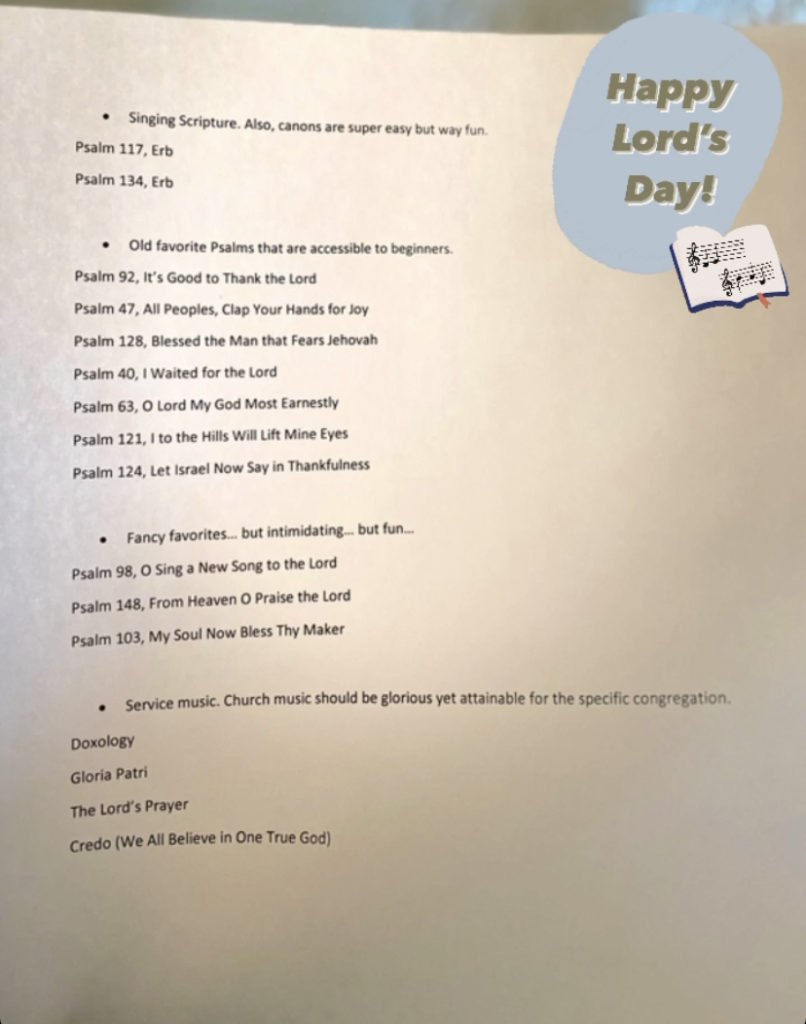
My family had the joy of introducing another family to the practice of Psalm singing today! My kids were on board with helping these new friends overcome nerves and tackle the unknowns in order to urge them on with us in the praise of God. We started with Psalms straight from Scripture, with canonical lines by Dr. Erb at @nsaconservatory that you can find in the #cantuschristi2020 from @canonpress
(Psalms 117 & 134)
Then we wanted to share some old favorites on which I cut my own milk teeth for Psalm singing a couple decades ago… mostly from the red Book of Psalms for Singing. My kids also wanted to show this family the joys of singing in parts, through arrangements of Psalms 98, 103, 148… and if I say “119X” do you know what I mean?! 😆 But we only had so much time, so we had to save some things for a later day.
…
I will sing to the Lord, for He has dealt bountifully with me. -Psalm 13:6
…
What a blessing to fill a home with people of God and praise to God! I was so honored to bring psalms, hymns, and spiritual songs to this room – and to bring these people into the learning and laughter of new skills. What a joy!
…
We memorized the entire Psalm 117 together to begin with, so they learned about unison, melody, harmony, canon… all in our first little foray into Psalm singing. A variety of Psalms followed, including two Psalms of ascent – perfect for the Lord’s Day.

…
We also sang some hymns of great virtue, focusing on the narrative of history and theology within their poetry (The Son of God Goes Forth to War! See, the Conqueror Mounts in Triumph!). But it is the Psalms which really grabbed this group. That’s my love language!
…
Psalms for Sunday. Nothing better.
Have I mentioned yet that I am trying to call our Morning Time routine something different now? Partly because “Morning Time” is a little inaccurate since sometimes we don’t do it in the morning… and the time of day is certainly not the spine of this family gathering. I know people who call it Gathering or Symposium… but the word that I recently stumbled on and decided to clasp is Collective. I feel like that word really captures the essence of what I want to accomplish and cultivate: collecting people together to collect & cultivate culture together. I mean, the simple definition in the dictionary is “a cooperative enterprise.” But in a homey way, I just love the idea of collecting my people and collecting truth, goodness, and beauty alongside them. THAT is the spine of what I want to do during this time.
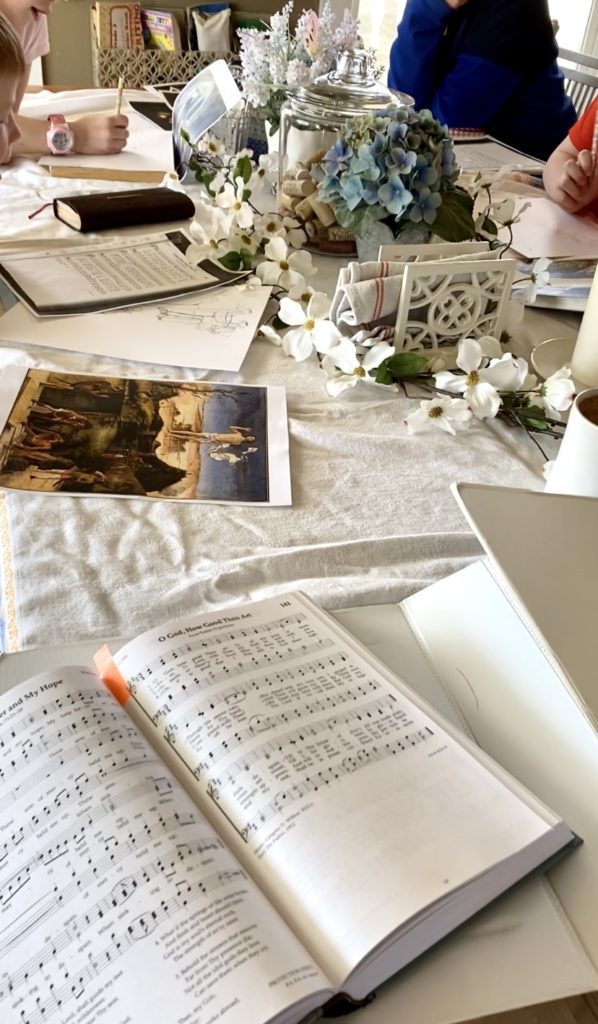
So my Morning Time posts are now simply Collective. Our Morning Time Cart is now happily renamed the Collective Cart. And we are trying to remember to refer to this time as Collective in conversation, even though we do occasionally slip into the old phrasing of Morning Time. Old habits really do die hard. I have been so ingrained with Cindy Rollins, Sarah Mackenzie, & Pam Barnhill’s teachings over the years that I can’t exactly just move on without some serious retraining. 😉 I’m too connected to Schole Sisters to make the switch lightly or simply!
Without further distraction, then…
FRIDAY COLLECTIVE, 4.16.21
Poetry Readings:
selections from Sing a Song of Seasons
selections from Amy Carmichael’s Mountain Breezes
Scripture Readings:
Psalm 24:1-10
Proverbs 16:1-16
John 6:1-21
Copywork:
Nehemiah 8:10
Then he said to them, “Go your way, eat the fat, drink the sweet, and send portions to those for whom nothing is prepared; for this day is holy to our Lord. Do not sorrow, for the joy of the Lord is your strength.”
Memory Work:
The Peace of Wild Things by Wendell Berry
1 Peter 3:10
G: Epilogue from The Lay of Redemption by Joseph Carlson
A: Jesus is the Beautiful Gate by Jason Farley
E: Resurrection Sunday (1) by Joseph Carlson
S: David (1 & 2) by Joseph Carlson
Catechism:
G & A reviewing the New City Catechism (finished all 52 here, so this is their third completed catechism)
E continuing through the New City Catechism (on question 20, this is her third catechism)
S continuing through The Kid’s Catechism (on question 82, this is his second catechism)
Hymn of the month:
Christ the Lord is Risen Today (Charles Wesley)
Psalm of the month:
Psalm 35, Behold, the Love, the Generous Love (Isaac Watts & Seaborn Denson)
Additional singing:
Taizé Gloria
Psalm 117
Psalm 92
Psalm 128
The Apostles (Jamie Soles)
Follow the Line (Jamie Soles)
The Beatitudes (David Erb)
Ancient History reading:
Mystery of History, Vol 1, pages 378-384
Story of the World, Vol 1, pages 285-287
Child’s History of the World, pages 159-163
Church History reading:
selection from Radiant by Richard Hannula
Fiction reading:
Strays by Remy Wilkins
stack of picture books, including Home in the Woods by Eliza Wheeler, We Are the Gardeners by Joanna Gaines, and Petunia by Roger Duvoisin
(…continued from Aletheia, part nine…)
The truth is, we are called to bear fruit in our motherhood. To produce it and to carry it. Put your hands to the work before you, planting and tending and praying for the coming harvest. The truth of who we are as mothers is that we are the nourishers and nurturers of the bodies, minds, and souls of the children entrusted to us. But it is not by our own strength that we can accomplish these things. It is only through the enabling strength of Christ, and His work on our behalf, that we can strengthen the bodies, instill wisdom in the minds, and fatten the souls of our children. This takes repentance. This takes humility. This takes a posture of being a student alongside our children, even while we labor as teacher. This takes being a discipler of our children, even while being a disciple of Christ alongside them.
Truthfully, there is no more important work than that of discipling our kids. Bringing them along with us to the Lord. We do this by faith, by example and by leading. Do your kids see the primacy of Christ in your life? Do they know that Scripture and prayer and repentance and forgiveness are the backbone of life? Are they growing in their knowledge of God’s Word? Are the affections of your family’s hearts set on things above or things on the earth? Is your family being conformed to this world or transformed by Christ and His Word? Are you pursuing being noticeably different than the world around you? How do your kids stand out as undeniably God’s children? Only the Lord knows the heart, but a tree is known by its fruit. Act, speak, and dress like redeemed people, purchased at a price.
Give your children opportunities to fellowship with faithful Christians outside your own home. Faithfully take them to worship corporately every Sunday morning. Show them the loveliness of the Lord’s Day by setting it apart from six days of work. Sing psalms and hymns and spiritual songs. Memorize Scripture in context. Teach through the practice of catechesis. Confess your sins against your children quickly and honestly. Forgive generously when your children sin against you. Be quick to listen and slow to speak. Smile in the faces of your children, and show them the joy of the Lord. Rejoice when your children rejoice, and sorrow with them when they are sorrowful. Show your children the grace of hospitality in the every day sacrificial acts of feeding them, clothing them, laying down your life for them even as Jesus washed the feet of His disciples. Tell your kids what you love about them, and what makes you thankful to be their mama. Speak blessing over them. Make your home a haven to which they long to flee for refuge, comfort, rest, fellowship, feasting, and joy. Lace the Word of God and the fruit of the Spirit through everything, because it is in Him that we live and move and have our being.
Proverbs 11:30 says, “The fruit of the righteous is a tree of life, and whoever captures souls is wise.” Capture your children in the wonder of Christ. Proverbs 3 says, “Do not lose sight of these—keep sound wisdom and discretion, and they will be life for your soul and adornment for your neck. Then you will walk on your way securely, and your foot will not stumble. If you lie down, your sleep will be sweet. Do not be afraid of sudden terror or of the ruin of the wicked when it comes, for the Lord will be your confidence and will keep your foot from being caught.”
Be encouraged, Mamas.
“But we are bound to give thanks always to God for you, brethren beloved of the Lord, because God has from the beginning chosen you to salvation through sanctification of the Spirit and belief of the truth: Whereunto he called you by our gospel, to the obtaining of the glory of our Lord Jesus Christ. Therefore, brethren, stand fast, and hold the traditions which you have been taught, whether by word or letter. Now our Lord Jesus Christ Himself, and God our Father, who has loved us, and has given us everlasting consolation and good hope through grace, comfort your hearts, and establish you in every good word and work.” (2 Thessalonians 2:13-17)
~~~
Heavenly Father, you are holy and you are good. You are the perfect husband and father. Please help us to rest in you, to bless Your name at all times, and to offer ourselves as willing vessels to be poured out for Your sake. Please mold us into godly wives who are complements to the specific husband you have given each of us, to be helpmeets that speak the truth in love, to grow in virtue, to be home centered home lovers. Please also mold us into godly mothers who love to nurture and nourish the children You have given us. Make us wise to the needs of our children’s bodies, souls, and minds. Cause us to be winsome examples for the sake of Christ, and enable us to lead our children in Your ways. Give us joy in the posture of humility as we repent of our ignorance and seek to grow in knowledge and wisdom even as we work to educate our children. Thank You for promising to be the God of our children, to those who love You and follow Your commandments, even unto a thousand generations. Enable us to mimic You in being kind, forgiving, generous, comforting, and truthful. Please return our minds and conversations to things which are worthy of meditation: honor, virtue, joy, and truth. Give renewed vision for who we are as Your people and how You have equipped us to work for Your kingdom. As we take dominion over the gardens allotted to us, please make us fruitful and bless the work of our hands. We offer ourselves to You in faith, knowing that You created and called us, and You will faithfully complete Your work in us. Please establish us in every good word and work, blinding us to falsehood and peeling the scales off our eyes to see Your truth. We thank You, and in the name of Jesus we boldly ask for blessing in all of these things. Amen.
(…continued from Aletheia, part eight…)
For a few years, I had an only child—and he took up all my time. Any extra time I had seemed to be spent researching how I could stop having miscarriages and give him siblings on earth. Motherhood was a very full time job, right from the get go. Now, a dozen years later, my five kids still take up all my time. I did not have more time then, I do not have more time now. Whether you have one child or ten children, motherhood is every day, around the clock. And I think this is never more true than for the homeschooling mama. I have some friends who don’t homeschool, and the things they accomplish during the hours when their children are away at school sounds absolutely fascinating to me. Floors get mopped and pianos get dusted? Hydrangeas get pruned and dental appointments happen on schedule? Who knew?! Their fruitfulness looks different than mine in many ways.
But mopping and dusting and pruning and planning aren’t paramount to me—nurturing and nourishing my children is. So I need to remember not to glance sideways at the fruit of others, but rather labor faithfully in the orchard where the Lord has placed me.
I would like to read you some wonderful words from a book called Building Her House, by a non-homeschooling mother:
“The wise woman understands that children are a source of joy and blessing entrusted to her by God, and she is to be a good steward of them, seeing that she takes care to dedicate her children to God and train them up as God’s own.” (Building Her House, Nancy Wilson, p61)
“Nothing we do in our homes is neutral; it will either feed and nourish or starve and impoverish.” (Building Her House, Nancy Wilson, p63)
“Life in our homes should be characterized by joy and thanksgiving so that children are taught and nourished in a way that takes their souls into account.” (Building Her House, Nancy Wilson, p17)
“Mothers must model forgiveness and repentance by seeking it themselves when they have been too hard on [their children].” (Building Her House, Nancy Wilson, p71)
Here are some key words that I gleaned from those quotes: wisdom, understanding, joy, blessing, entrusted, steward, care, dedicated, training, feed and nourish, starve and impoverish, thanksgiving, souls, model, forgiveness, repentance.
When was the last time you sinned against one of your children? When was the last time you asked their forgiveness? Over the years, I have grown in my repentance and begging forgiveness, but I still have much room to grow. Is your home characterized by joy and thanksgiving? Does the ambience in your home take the souls of your children into account? What might look different about it if you really thought about pursuing that nuance? Do you ever think that you are doing something neutral? That how you act, the work you do, the discipline or training of the kids, even the way you do the laundry could be neutral? Does it make your brain do a somersault to consider the idea that every action you take and every sentence you say will either nourish or impoverish your child? Do you look at your children as treasures that have been entrusted to you by God? Do you steward them well? What kind of profit will He see when He looks at these children in your care? Do we see beyond the diapers and fitful nights and math troubles and sibling squabbles and teen angst and acne and gangly limbs… to daily remember and recognize that these are immortals in our presence? Do we constantly consider the fact that the souls of these children will live forever? How can we live circumspectly to keep that in view?
Starting with prayer and praise is always a good answer. Seeking the face of the Lord and asking for Him to give that perspective and circumspection.
I also find that there are things I can do to put myself in the posture of that perspective. For instance, in the morning when I first see my children, I endeavor to hug them and greet them with a smile—whether or not I slept well, feel well, or even have an emotion of kindness at that moment. Praying with them and for them throughout the day, at prescribed times as well as in the heat of various moments. Remembering that not only are they as deeply human and personal as I am but that they are image-bearers of God and beloved of Him, my brothers and sisters in the Lord as well as my offspring—and in remembering their frailty as humans, making a point of physically connecting with them through the day by kissing a forehead, squeezing a hand, rubbing a shoulder, scratching a back, snuggling on the couch. Not all of my children are as fed by physical touch as some of them, but it is a good practice to fill up their love tanks not only with tasty meals, hot chocolate, funny stories, and the occasional date night, but also with physical touch.
Another thing I think is important is to leave my children at night with a feeling of comfort and confidence and care. No matter how hurried the bedtime routine has to be even on our latest or craziest nights, it must include praying over the children, singing them Numbers 6:24-26 as a blessing, and saying “peace be with you” to each child. I think it is really important for them to go to sleep knowing that we are at peace with one another, that I am asking for God’s blessing on them, and that I care for them intimately. I also have one child who struggles a little more than the others with feeling loved or wanted or appreciated, so I try to make a point of often saying “I am really thankful for you. I am thankful to be your mama. I really love X about you.” Nurturing and nourishing the mind and soul of my children is just as important as feeding and providing for their physical bodies.
Of course one of the main passions I have as a Christian homeschooling mother is bringing my children with me to the feet of Christ. It is important to nourish and nurture their bodies, their physical and mental selves, of course. But the sacred work of discipling them for the Lord is where we really get to live out what we say we believe. And that is precisely because we bring them with us to the feet of Christ in everything else we do.
Mark Chanski wrote, “How does a married woman with children forge a noble reputation in God’s eyes? She hammers it out on the anvil of sacrificial mothering. She gives herself wholly to the sacred mission of nurturing God-fearing children, from a spiritually healthy home environment… My goal is not to raise low-maintenance children, but lion-hearted ones.” (Womanly Dominion, Mark Chanski, p102/p141)
My friend Mystie Winckler has a saying: Repent. Rejoice. Repeat.
This is such a good and easy reminder to constantly have running through my head as I go about my day at home—one sinner running a three ring circus starring five other sinners. My day should be a continual cycle of repentance. Repenting of apathy. Repenting of selfishness. Repenting of a snappy response. Repenting of an unkind tone. Repenting of wrong priorities. Even education itself is a kind of repentance: it is repenting of ignorance.
I ought to be the one practicing repentance most openly, as I seek to bring my children with me in the sanctifying journey of daily living with the cross of Christ ever before us. “For the word of the cross is folly to those who are perishing, but to us who are being saved it is the power of God… Where is the one who is wise?… Has not God made foolish the wisdom of the world?… We preach Christ crucified!… Christ the power of God and the wisdom of God… God chose what is low and despised in the world, even things that are not, to bring to nothing things that are… and because of Him you are in Christ Jesus, who became to us wisdom from God, righteousness and sanctification and redemption…” (1 Corinthians 1)
Amy Sloan writes, “God’s delight in us is due solely to the perfect obedience of His Son, not our amazing homeschooling.” Our daily living is to be one of repentance and rest in what Christ has done for us and for our children. Amy continues, “humility and repentance is an essential posture of the teacher and, in imitative turn, of the student.”
Like all children, mine ask constant questions. There is a continual seasoning in my homeschool days, constant peppering with How and Why. You might think, since my children are still fairly young and their grandest of questions are still relatively narrow in relative scope, that I would “have all the answers.” Or maybe you come from a background full of the classic responses of, “because I said so” or “it just is.” But my own ignorance is a reason for repentance, and the humility I long to see in my children needs to be exemplified in me as their example. George Grant says that “true education is a form of repentance. It is a humble admission that we’ve not read all that we need to read, we don’t know all that we need to know, and we’ve not yet become all that we are called to become. Education is that unique form of discipleship that brings us to the place of admitting our inadequacies.”
I have learned to love the posture of humility as I honestly reply to a question with, “I do not know.” And the real joy comes when I don’t leave it there. We repent of the ignorance by then saying, “Let’s find out together.”
C.S. Lewis said, “The surest sign of true intellectual acumen is a student’s comprehension of what it is he does not know; not what he does know. It is a spirit of humility that affords us with the best opportunity to grow, mature, and achieve in the life of the mind. It is knowing how much we do not know that enables us to fully embark on a lifetime of learning; to recover to any degree the beauty goodness and truth of Christendom.”
G.K. Chesterton encourages us that it is, “Far better to seek the wisdom of the common, the ordinary, and the humble—for God resists the proud but gives grace to the humble.”
Research with your kids, plumb of the depths of the unknown hand in hand, seek knowledge and instruction and wisdom together. Unhindered by arrogance. Leave pride and self-righteousness and laziness at the door. Actually, kick it right out into the back alley. Teach your children that you are walking with Solomon in the pursuit of wisdom. If you don’t know where to begin, begin with Proverbs 1. Continue through Proverbs 31. And then do it again! Read Proverbs with your children on repeat. Not because the act of simply doing it will add any jewels to your crown, but because bathing ourselves in the wisdom of God slowly saturates us with Himself. And that is ultimately what we ought to be pursuing in our motherhood, in our homeschooling, and in every other aspect of who we are.
(…continued in Aletheia, part ten…)
(…continued from Aletheia, part seven…)
My friend and mentor Cindy Rollins says that “Motherhood is a place of dreamy hopes and crushed fantasies and the hard, hard work of sinners in relationship with each other day by day.” It is the truth about sin that makes us genuinely Christian mothers: we are sinners raising sinners, and we learn together about the life God calls us to: at the forefront being a life of humility and repentance and forgiveness and grace. Bear that in mind as we move forward.
Scripture is absolutely dripping with verses about children, childrearing, parenthood, and familial living. Familial terminology is in every book of the Bible, one way or another. There is no escaping it. One of my favorite places to get wisdom and encouragement for my entire Christian walk, including motherhood, is in the Psalms. Psalms 127 and 128 were some of the first Psalms I committed to memory using song, and I can not count the moments where I have just repeated them over to myself, or aloud to my children, as a way to wash us and fill us with the truth of the gospel.
“Behold, children are a heritage from the Lord, the fruit of the womb is a reward. Like arrows in the hand of a warrior, so are the children of one’s youth. Happy is the man who has his quiver full of them; they shall not be ashamed, but shall speak with their enemies in the gate.” (Psalm 127) “Blessed is every one who fears the Lord, who walks in His ways. When you eat the labor of your hands, you shall be happy and it shall be well with you. Your wife shall be like a fruitful vine in the very heart of your house, your children like olive plants all around your table. Behold, thus shall the man be blessed who fears the Lord.” (Psalm 128)
Okay, now, two things right out of the gate: when it says “man” in these chapters, let’s just agree not to get our skirts all rumpled about it; and also, let us remember that it is not the number of arrows which brings victory, but the potency with which they fly. Our God never quibbles over quantity, but rather uses the weak to confound the strong, the small to bring down the mighty. Straight arrows with stout hearts are those which fly true when released from the bow. If you have weak, crooked, splintery arrows, it doesn’t matter how many are loosed from the bow—they will not fly true and hit the target.
Psalm 139 is another beautifully poetic look at motherhood, more from the child’s perspective. And Proverbs is written from a father to his son (with a bit at the end from the mother), so of course there is much to be gleaned about parenting throughout that entire book, as well as basic Christian living and the importance of following lady wisdom and turning away from lady folly. Particularly good Proverbs to note when it comes to motherhood might be the following:
“Train up a child in the way he should go, and when he is old he will not depart from it.” (22:6)
“My son, keep your father’s commandment and forsake not your mother’s teaching.” (6:20)
“Listen to your father who gave you life, and do not despise your mother when she is old… Let your father and mother be glad; let her who bore you rejoice.” (23:22, 25)
“Hear, my son, your father’s instruction, and forsake not your mother’s teaching, for they are a graceful garland for your head and pendants for your neck.” (1:8-9)
As mothers, we have countless duties and responsibilities, but I like boiling it down to a few broad categories for discussion. We are called to bear fruit, to nourish, and to disciple. There are any number of ways to accomplish these goals, and the Lord is gracious to give each mother special skills and particular creativity. I also find one of the main ways God speaks of a mother in Scripture is as a comforter: a refuge, a place of rest and warmth and haven.
“As a mother comforts her child, so I will comfort you…” (Isaiah 66:13)
“But I have learned to feel safe and satisfied, like a young child in its mother’s arms.” (Psalm 131:2)
Bearing fruit is something God made us to do—and it doesn’t just mean that we are created to produce babies. It does include that, but it is not limited to that. We are to produce good fruit wherever our hands go to work. One of my favorite things I ever read was a section from Rachel Jankovic’s book Loving the Little Years, where she describes what a fruitful mother should look like. This was during a time when I was particularly struggling with not looking like a fresh, young sapling anymore—and reading her encouragement that I ought to look like someone who has borne fruit was somewhat mind-blowing to me. Such a simple thing, yet it stunned me. Of course I was like a fresh, young sapling at one time—and even after a couple of harvest seasons, I was still fairly flexible, trim, and aiming high. But once the apples began falling from my branches in subsequent years, it soon became undeniable that as my roots went deeper and my boughs got heavier, my bark got thicker and I became more stout. Also more rigid and brittle in places. But at that point, we have to realize that it becomes less about watering the tree and staking it up during winter storms, and more about faithfully gathering the apples up so they don’t rot on the ground or get eaten by critters. The tree gives up its own glory, and the attention is turned onto the glorious fruit. And this is good.
I have been called to be fruitful in sacrifice, and to sacrifice in my fruitfulness.
I am being physically and emotionally used up and spent in order to bear fruit—in the form of babies, yes, but then also in the longer work not just of bearing them from my body but bearing them through their childhoods. Now I bear their burdens alongside them. Some of the sacrifices I make are so easy they don’t even feel like sacrifices—other sacrifices are genuinely painful, but my job includes the joy & privilege of laying down my life in all the big & small ways to bear my children from year to year to year. Nurturing and nourishing them, in body and mind and soul.
(…continued in Aletheia, part nine…)
Holy Week, viii ~ Resurrection Day!!
The tomb is empty!
He is not here!
Christ has risen, as He said!

Scripture Reading:
Isaiah 25:6-9
Psalm 118
Acts 10:34-43
1 Corinthians 15:1-11
Mark 16:1-8
John 20:1-18
Hymns:
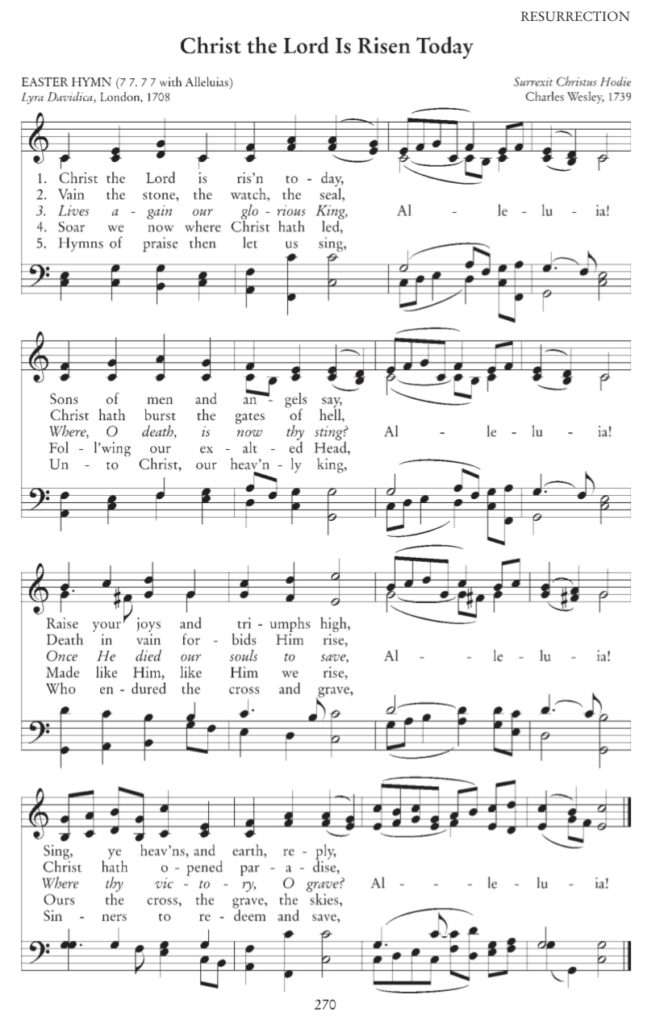
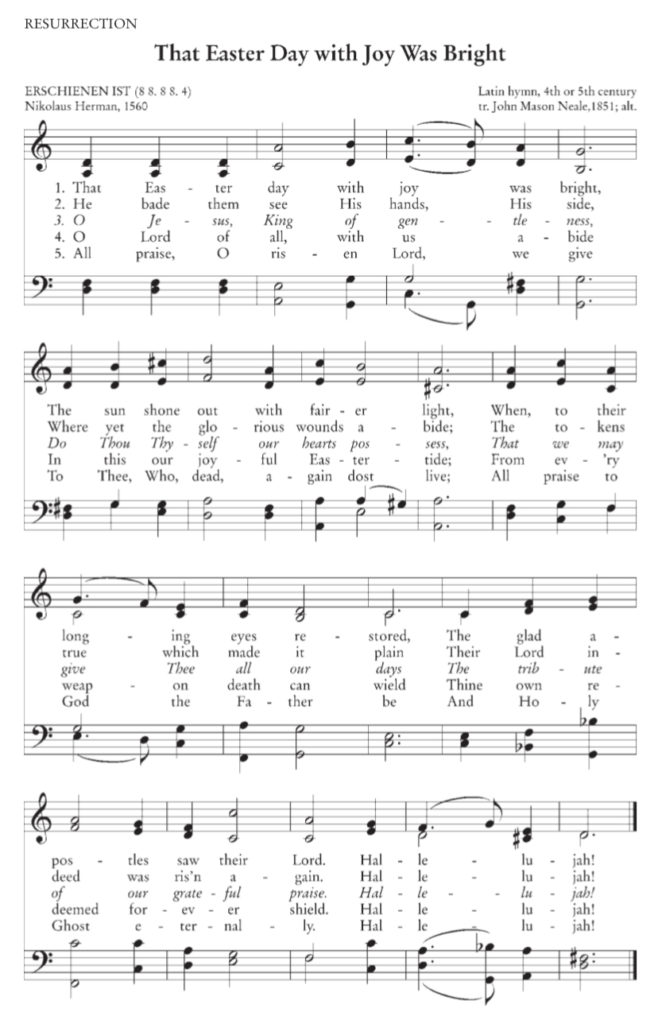


Poetry:

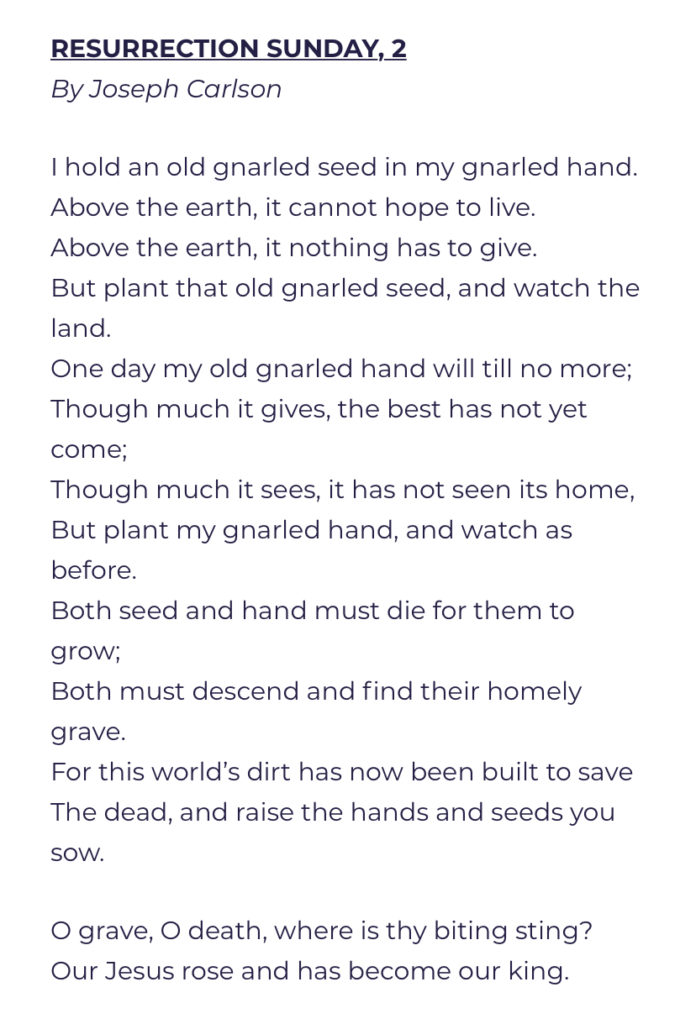
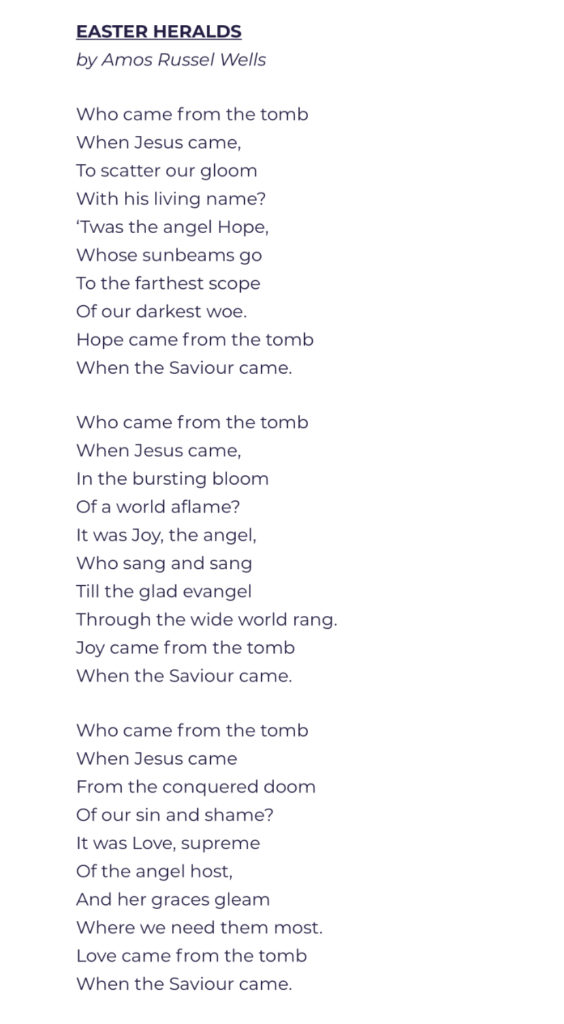

Special Food:
Family breakfast: Cinnamon Squares from Magnolia Table cookbook, sausage, fruit salad, & Lindt truffles.
Big Family fellowship dinner: ham, pineapple casserole, scalloped potatoes, roasted asparagus, dinner rolls (recipe from King Arthur), and malted chocolate cream pie.
Activities:
Decorating the tables with signs of joy and life (flowers, candles, chocolates, linens)
Setting the table with china & glassware
Giving each child two new books, wrapped prettily ~ and a card game for them to share
Worship corporately! Sing loudly, joyfully take communion, rejoice in the midst of the assembly!
Fellowship with loved ones! Invite friends & strangers! Feast! Sing! Hunt for eggs! Praise the Lord for His kind mercy in all things seen and unseen, physical and spiritual, now and forever!
Art:

Listening:
Holy Week, vii ~ Holy Saturday
Mourning
Sorrow
Forgetting
Jesus in Sheol
Sabbath

This day is one of lamentation and wondering. No festal activity, but lots of prayerful song mingled with art both visual & verbal, with a constant background of musical lamentation. Nothing like my two favorite requiems for this Holy Saturday.
Scripture Reading:
Job 14:1-14
Psalm 31
Matthew 27:57-66
1 Peter 4:1-8
Poetry:
Poem for Holy Saturday by Joseph Carlson

Sepulchre by George Herbert

Cry, Beloved by Ben Palpant
Blessing for Waiting by Jan Richardson, excerpt
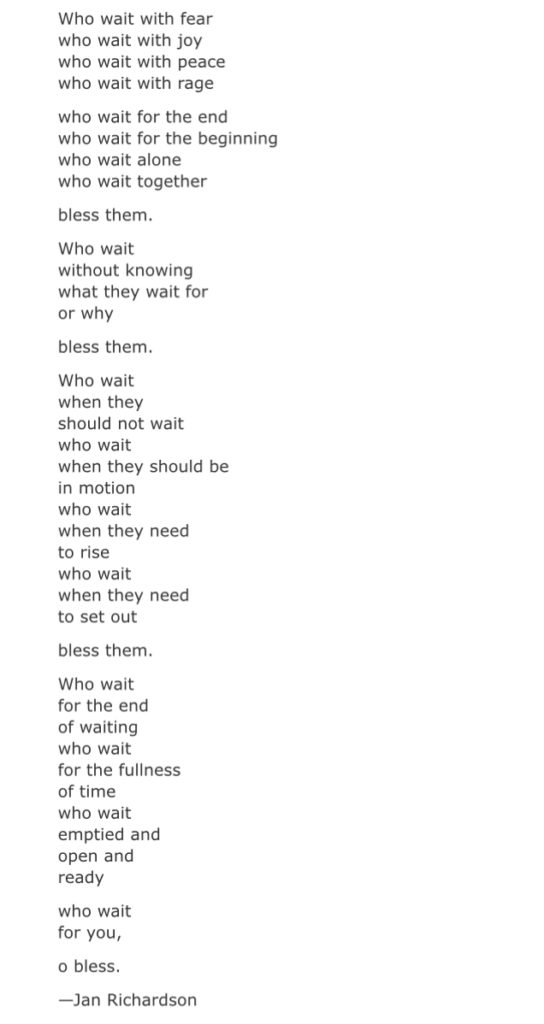
Hymns:
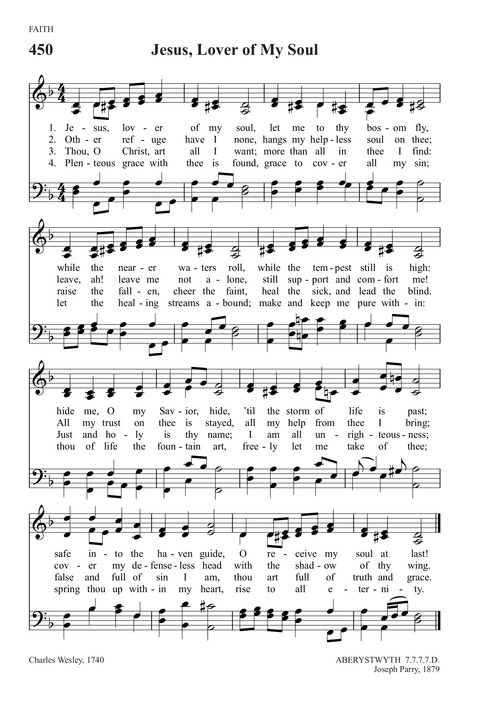
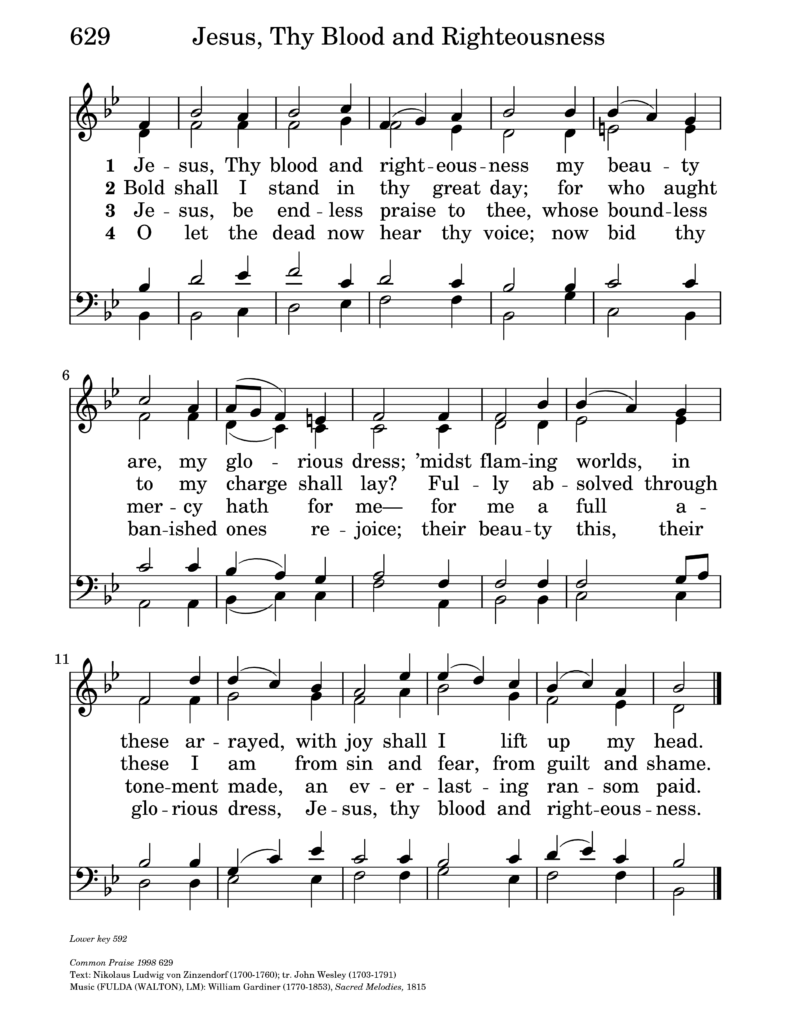

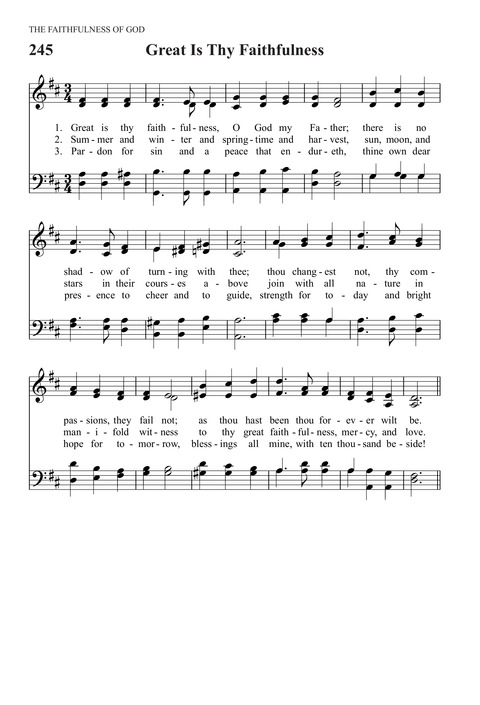
Art Study:


Listening:
Holy Week, vi ~ Good Friday
Trial of Christ
Torture of Christ
Mocking of Christ
Conviction of Christ
Crucifixion of Christ
Conversation with thieves
Conversation with loved ones
Darkness
Final words
Death
Rending of the veil
Earthquake
Graves opened
Soldier breaks and pierces
Jesus is laid in a borrowed tomb
Scripture reading:
Psalm 22
Isaiah 52:13-53:12
Hebrews 4:14-16 & 5:7-9
John 18:1-19:42
Hymns:
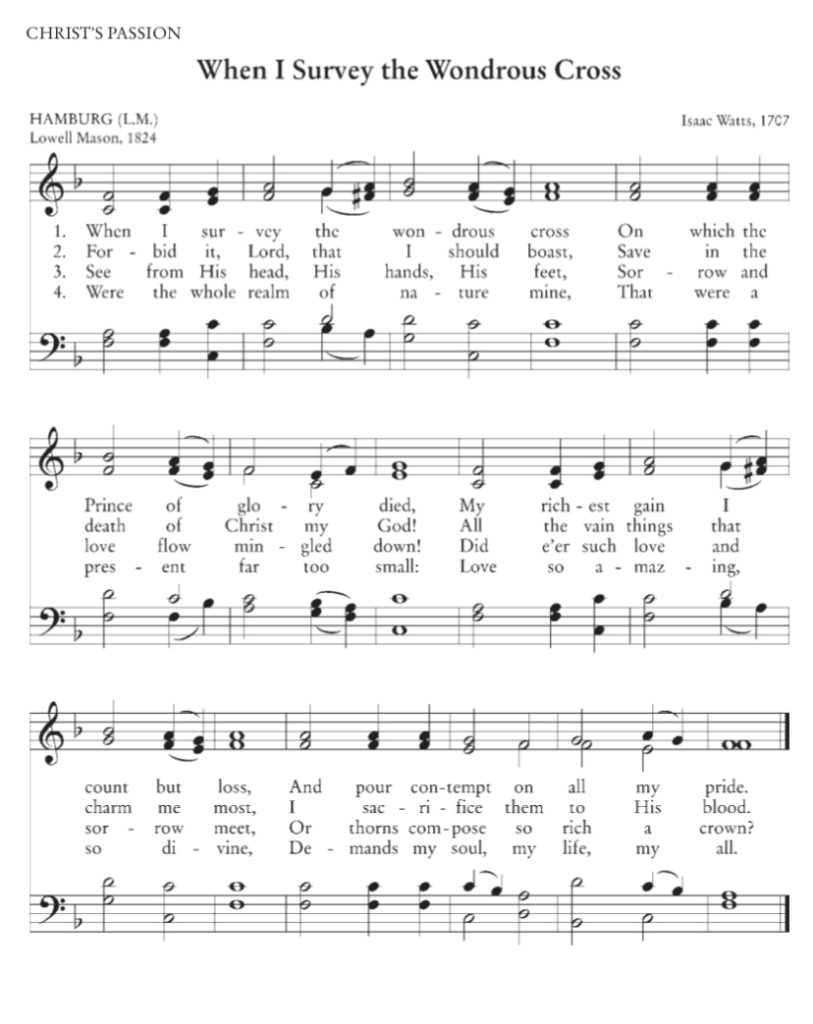

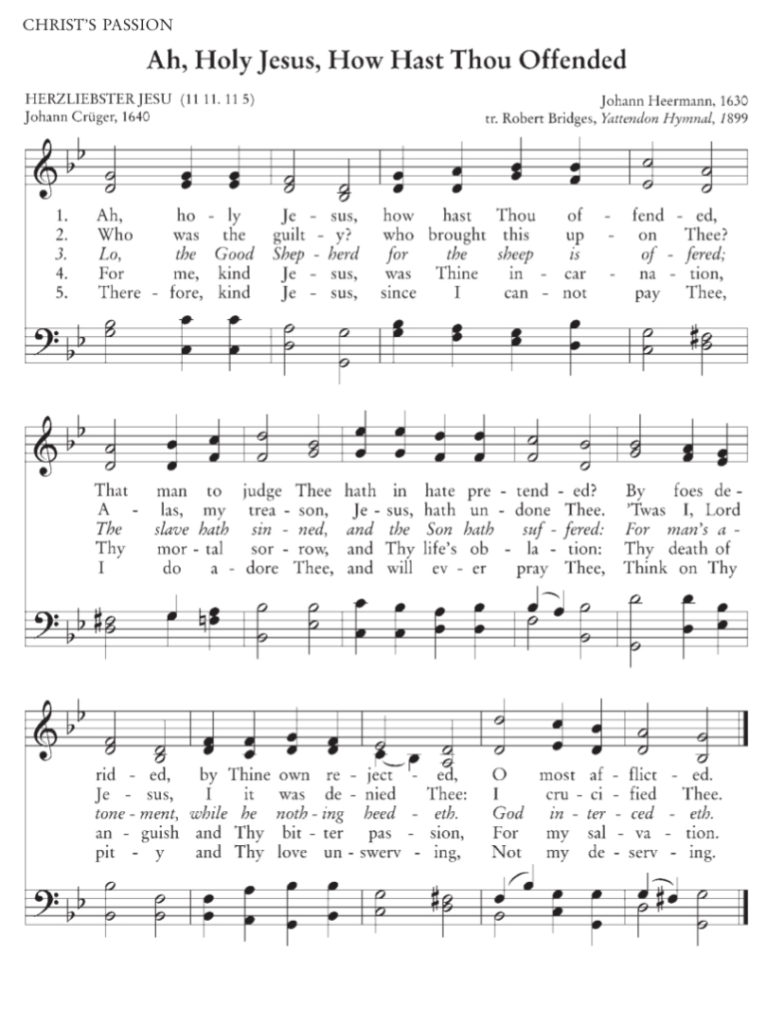
Poetry:
The Lay of Redemption by Joseph Carlson
The Whirlwind Bides His Time by Joseph Carlson
The Stranger by Ben Palpant

Activities:
Make a Resurrection Garden–closing the tomb and setting a toy soldier as sentry

Bring out the crown of thorns (we made it years ago like this) and place it on an empty table

Special Food:
Hot Cross Buns
(I used this recipe)

Art Study:


Historical Practice Study:
The stations of the cross for protestants, through book and art and poetry.
Stations of the Cross for Children by Julianne Will


https://malcolmguite.wordpress.com/2012/04/04/good-friday-the-stations-of-the-cross/
Listening:
The Crucifixion: A Meditation on the Sacred Passion of the Holy Redeemer is an oratorio composed by John Stainer n 1887
(…continued from Aletheia, part six…)
First we talked about who we are as each being a particular helpmeet given to our particular husband, and then we talked about the spiritual side of being a wife who is growing in virtue—and I think they spiral together beautifully, when we seek to bless and help our husbands through the work of our hands and prayers, which both require virtues abundant… and now we turn to a third aspect of who we are as wives.
We read in Proverbs that “The wise woman builds her house, but the foolish pulls it down with her hands.” (Prov 14:1) And again: “Through wisdom a house is built, and by understanding it is established; by knowledge the rooms are filled with all precious and pleasant riches.” (Prov 15:6) So to begin with, let me say that as we are talk about wise domesticity, I think those two Proverbs are a really good foundation for the conversation. In Building Her House, Nancy Wilson asks, “What is it that makes our homes truly pleasant places? Without a doubt, it is godly wisdom. When wisdom is at home, home is a delight.” (Building Her House, Nancy Wilson, p99) Extrapolating the opposite, I think we can also infer that when there is folly at home, home is unlovely.
Again referencing Titus 2:3-5, we look to the Apostle Paul for wisdom. This is where we read that older women are to “be reverent in behavior, not slanderers, not given to much wine, teachers of good things”—and then we can ask, what are the good things that need to be taught? Wisdom wants to know so that we can build our house! We want to understand so that our home can be established! We want to grow in knowledge so that the rooms of our domain will be full and pleasant. Well, we read on to see that the older women are to “admonish the young women to love their husbands, to love their children, to be discreet, chaste, homemakers, good, obedient to their own husbands”—and why is this? Paul gives us the exact reason: “that the word of God may not be blasphemed.” (Titus 2:3-5)
It isn’t so that we will have the best house on the block, the most curated Instagram, the cutest family walking in to church on Sunday… It isn’t even so that we will be known as a fantastic wife or as a super godly Christian. Nope. The reason the older women are to teach the younger women these things is for God’s glory, and to uphold His holy Word.
When I was young, I always found it interesting that young women need to be taught to love their husbands and to love their children. At least those things seemed to be such natural things—even if we struggle with discretion or chastity, goodness or domesticity or submission. Loving my husband and children? Why would I need taught that?! As I have gotten older, I have realized that my understanding of love has grown, and I now know that loving my husband and loving my children actually takes practice and discipline! Learning how to love these particular people given particularly to me is a lifelong education as a wife and mother. And I do not want to grow weary or lazy in the pursuit of this good work. So having older, wiser women to remind me—admonish me—to love well and love specifically and love in truth is a real gift. And as I get older, I get to link arms with the younger women to remind them of these truths as well.
Love your husband. Love your children. By doing these things you will proclaim the purity and verity of God’s Word.
In 1 Peter we read that we are to “be of one mind, having compassion for one another, loving one another, be tenderhearted, be courteous, do not return evil for evil but rather blessing…” (and later), “be serious and watchful in your prayers. And above all things have fervent love for one another, for love will cover a multitude of sins. Be hospitable to one another without grumbling. As each one has received a gift, minister it to one another, as good stewards of the manifold grace of God.” (1 Peter 4)
Who we are in our emotional, mental, and spiritual selves is who we are in our active, physical selves as well. We live our theology! It comes out in our thoughts, words, and actions. What you believe necessarily shapes how you live. So these passages from the New Testament are telling us as Christian wives how we are to live out our theology in wisdom. I am still in the mid-generation of womanhood: I have older women who teach me, and I have younger women who ask to learn from me. But right here are the most solid things I have both learned and now teach as a Christian wife: I am to be reverent, chaste, a teacher of good things; I am to love my husband and love my children; I am to be discreet, home centered, and obedient to my husband; I am to be compassionate, loving, tenderhearted, courteous, prayerful, forgiving, and hospitable. (And any of it, by God’s grace alone.)
A number of years ago, I started this blog, calling it Joyful Domesticity. I knew that those were two words that I needed to have constantly in front of me to remind me of my duties: I was called to be joyful and called to pursue the arts of domesticity. I would dare say that those many things I just listed off could boil down roughly to joy and domesticity. Those two things are indescribably broad, yet beautifully narrow.
Allow me to share with you an excerpt from an essay called, “The Emancipation of Domesticity”:
But when people begin to talk about this domestic duty as not merely difficult but trivial and dreary, I simply give up the question. For I cannot with the utmost energy of imagination conceive what they mean. When domesticity, for instance, is called drudgery, all the difficulty arises from a double meaning in the word. If drudgery only means dreadfully hard work, I admit the woman drudges in the home, as a man might drudge at the Cathedral of Amiens or drudge behind a gun at Trafalgar. But if it means that the hard work is more heavy because it is trifling, colorless and of small import to the soul, then as I say, I give it up; I do not know what the words mean. No; a woman’s function is laborious, but because it is gigantic, not because it is minute. I will pity Mrs. Jones for the hugeness of her task; I will never pity her for its smallness. ~ G.K. Chesterton, from “The Emancipation of Domesticity”
I think the words “gigantic” and “hugeness” are lovely there. The height, depth, and breadth of our work as wives and keepers of homes is undoubtedly enormous. Nancy Wilson says that “It’s one thing to have strong views about the glorious calling of vocational domesticity; it is another thing altogether to live it out, day after day.” (Building Her House, Nancy Wilson, p39) Yes, it is exhausting. But it is not exhausting because it is small, unimportant, or boring. It is nothing short of the business of the entire world, bundled up into one home, over which we as wife are regent. It is our job as keeper of the home, or homemaker, to keep it and make it. Not as a place to constantly be heading away from, bustling hither and yon, but as the place to which everyone is magnetically pulled. A place to gather and feast, to celebrate and rejoice, to grieve and mourn, to study and learn. Home is not just where we rest at night: it is where we create community, foster fellowship, live life.
Domesticity is a broad field and encompasses all of life in and around the home. We could go back to Proverbs 31 again, and see the incredible skills and talents and capabilities exhibited in her creative, innovative industries… but let me simply say, we can not create a to-do list (or a to-learn list) from Proverbs 31. That is not what we are called to do with this passage of Scripture. Rather, it is a description meant to inspire us toward our own domestic joys! That woman is clearly enjoying herself, flourishing and prospering, and using what gifts, resources, and opportunities God has given her. So we ought not individually feel burdened to produce something comparable to the Proverbs 31 description (what a relief!), but exhorted to follow the lead of her attitude, her industrious nature. No two homes will be exactly alike, but it ought to be our goal to have homes which are well-managed and which well-represent the family living there. Nancy Wilson said, “if we want to change the world one home at a time, then we have to start by taking dominion of our own homes.” We must determine to become skilled at the tasks God has assigned us.
Psalm 128:3 says, “your wife shall be like a fruitful vine in the very heart of your house.” The wife is central, at the heart of it all. What a privilege! What a responsibility.
So in the heart of our house, we are to imitate our God, the Maker. We are to be making our homes, taking dominion there, subduing the dust bunnies and laundry hampers and our own selfish ambition. We understand that without Christian homes, there can be no Christian culture: each one of our homes is a building block in the big project of Christendom. Keep the big picture in view. And be a woman who fills your home with good things, pleasant things, necessary and true and lovely things. Glorified things! Hot meals, cold drinks, the best stories, good music, birthday gifts, laughter, justly metered work, limitations and consequences, cleaned messes, songs and back scratches. A woman who fears the Lord provides stability, comfort, beauty, and order in her home. This is wisdom. And it is a tall order, requiring faith, hard work, and a vivid imagination.
What I can lose sight of so quickly is that it isn’t about me doing or being these things. It is about Christ in me, accomplishing good works He prepared for me, in order to further His kingdom. It is about the work He accomplished for me as my Redeemer, and now I get to live in submission to Him. We could list off all the things we do as wife and homemaker: but none of it matters if I am not given over to the Holy Spirit.
So the third truth about who we are as wives is that we are given the vast dominion of the home to subdue, cultivate, craft, fill, and share. How we each live that out will necessarily look different from home to home—but living it out in wisdom will build your home and bless your husband when you are focused more on the work Christ did for you than on the work you now do for Him.
As wives, we get to shine the truth of the gospel by seeking to be obedient, wise, virtuous, helpful, domestic artists ~ all for the furthering of God’s kingdom.
(…continued in Aletheia, part eight…)